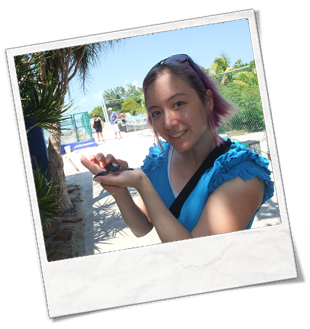Q&A WITH EngHERO: Erika Kiessner
Erika Kiessner is an exhibit developer for an independent exhibit design and fabrication company. She creates all the cool interactive exhibits at places like the ROM or Ontario Science Centre!
Q: What’s one thing you wish you knew about engineering back when you were in high school?
I honestly wasn’t sure what I was getting into when I signed up for engineering. I just knew that it was a good place to go if you were good at math and interested in science. I guess I wish someone had told me how abstract it is. An engineering degree isn’t about learning a set of concrete skills. It is more about learning a set of mental tools and approaches for solving problems. Thankfully that toolkit can be useful in a lot of fields. I’m very glad that I did an internship as part of my degree. It showed me the kind of work that I wouldn’t be happy doing long term.
Q: What’s your proudest accomplishment as an engineer?
This question is hard since I don’t work as an engineer. I have done some work doing mechanical and electrical design for artists and I have developed some elegant systems for several art pieces. Ironically the mechanisms were all hidden away inside the pieces so no one but me could really appreciate them!
Q: Tell me about a time in your career when your work has been about discovery or curiosity?
I am very fortunate that most of my career has been about discovery and curiosity. I have done a lot of work for science museums and to properly design an exhibit to explain a concept you really need a deep understanding of that concept. Plus, one of my goals in designing a good exhibit is to get people curious. And to do that I have to be curious myself.
Q: What are you doing these days?
My job now is as an exhibit developer for a small independent exhibit design and fabrication firm called Aesthetec Studio, in Toronto. We do concept development, prototyping and electronics fabrication for exhibits for museums and other institutions. Basically anything interactive that is a hybrid of the digital and physical is in our wheel house. I started at the Ontario Science Centre as floor staff talking about science to visitors.
I knew before I graduated that I wasn’t interested in going into a traditional engineering job and through my undergraduate thesis, I got to know some people at the OSC. So I started on the floor and worked my way into designing exhibits, something I can definitely thank my engineering degree for.
I spent three years there developing new exhibits and that was where my career started. After the OSC I took a year to do a masters degree in Fine Arts, specializing in interaction design. This gave me another set of tools to apply to my practice and helped me look at my work in more than one way.
Q: Do you feel your work contributes to society? How so?
Absolutely. My work is meant to teach people about the universe and more importantly, get them excited about finding out how and why things work.
Q: Why do we need more female engineers?
I think there are two reasons. The first is that in any field that is involved in problem solving, the more perspectives that come to a problem the better scope the proposed solutions will have. The second is that engineering culture would be better served by having more women, for much the same reason.
Q: Why do you personally believe the statistics are the way they are in terms of females in engineering?
Not all of the streams of engineering have an unbalanced female to male ratio. At the University of Toronto, where I studied, chemical engineering was affectionately known as “Fem Eng” because it was predominantly women. Similarly, I would estimate that industrial engineering, the stream I studied was about 40% women. I believe computer engineering was a bit lower but the ones that really stood out were mechanical engineering and electrical engineering, in which there were far more men than women. So what I really wonder is why some types of engineering attract women and others do not.
Generally, I think males get more encouragement to be strong in math and science than women do. That is changing, I hope. I also think that females are more willing to assert themselves in these areas over any societal opposition, than they were a generation ago. The old guard is turning over into the new, and ever more women will get into engineering. At one time doctors were all men and now women are pretty much equally represented. I think engineering will go that way too.
– – – – – – – – – – – – – – – – – – – – – – – – – – – – – – – – – – – – – – – – – – – – – –
Check out Aesthetec Studio‘s work
